 |
| Image credit: New Game Network |
 |
| Image credit: New Game Network |
 |
| Image credit: New Game Network |
 |
| Image credit: New Game Network |
 |
| Image credit: New Game Network |
 |
| Image credit: New Game Network |
 |
| Image credit: New Game Network |
 |
| Image credit: New Game Network |
Well, here we are again. A whole 12 months since the last time we did one of these yearly roundup articles, and 10 months since I decided to retire from the Junkyard for the sake of my fragile sanity. Going against my better judgement, I thought it would be nice to pop in to the 'Yard at this special time of year to look back in anger with fondness at some of the highlights of 2023, published by the hard-working and dedicated team of nerds who keep this place going in earnest. Even with the AI-powered threat of the Dead Internet™ and Big Gaming Websites™ slowly terraforming the entire World Wide Web into a sanitised, homogenous wasteland of black text on white backgrounds and carefully prepared press bullshots, The Dreamcast Junkyard is still here showing that little niche blogs can survive in the present era. But, y'know, that's not to say if some conglomerate wants to buy us out for a few million quid we wouldn't listen to offers. Of course, I jest...cough.
Now, back to that actual topic at hand. The dystopian nightmare that is/was the year 2023AD. It's been...interesting. So much new Dreamcast news to report on, new releases to salivate uncontrollably over, and original features that simply wouldn't write themselves without the aid of an advanced large language model and a few clever prompts. Yes, the humble Dreamcast has had quite the year, and so without further ado, I present to you a concise(ish) whistle-stop tour de force of the choicest cuts and hottest takes published here over the last 365(ish) days.
Are ya ready? Here we go...
 |
| Credit: The Sega Guru |
This year saw even more Japan-only titles translated into English by the dedicated Dreamcast fan translation community. There are many talented people involved in this niche within a niche (with a special nod to the likes of Derek "God" Pascarella, VincentNL, SharkSnack, Rolly, RafaMGam, TheKitchenSunk, Harpu, Ozidual, DocHikari, dukeblooders, Marshal Wong, Duralumin, James Tocchio/GGDreamcast, Yuvi, Cargodin, rio de popmocco and TapamN, to name but a few).
Some of the most notable titles to receive an English language translation were covered by Lewis here at The Dreamcast Junkyard, with one of them even being worked on by him (Nakoruru). Check 'em out:
As a group of proudly obsessed Dreamcast fans here at the Junkyard, we don't simply leave our admiration for Sega's 128-bit box of wonders at talking endlessly about the games, hardware or accessories that most people associate with the console. For us, the Dreamcast is life, and we need little encouragement to escalate our borderline obsessive behaviour by purchasing as much plastic tat merchandise associated with the console as our little wallets can handle. Genuinely, we would buy a bin full of sick if Sega printed a swirl on the side and called it the “DreamBin” (Lewis, copyright that shit right now).
But of course, we don't actually need to stock up on vomit-filled metal containers, because Sega, and the various publishers of Dreamcast games, have seen fit to release or provide their license to a whole assortment of items related to the console and the games that made it great. Some of these are awesome… so awesome in fact that this article will mark the start of what will become a long-running series of “Mike's Random Dreamcast Top Tens”, with this first one looking at some of my favourite pieces of merchandise that you too can buy and put on a shelf, and admire from a distance with a tear in your eye as you realise you'll never have enough time to play all those games you've bought, but purchasing mass-produced nonsense for display like your 80 year old grandmother’s collection of porcelain dolls is now your life.
Enough waffle. Let’s get on to today's random list, and too late for you to be able to get these in your stocking for Christmas! A pre-emptive warning - I may have my tongue firmly in my cheek for much of this article.
Dreamcast Socks
I write this as the full charade of Christmas is upon us. There are the sounds of happy little children outside, seasonal songs fill the airwaves and I can catch a glimpse of a tinsel and fairy light bedecked tree from my games room. I hate it. The children are little arseholes, the songs are shit and that tree is a fire hazard. No one remembers the true meaning of Christmas anymore - no, not Jesus (hail Satan), but family members you see for one day a year giving you shitty socks because they are bereft of ideas and refuse to indulge you in your childish love of gaming.
But here's an idea - get those family members to buy these snappy little numbers and everyone's a winner! When Sega remember they have licenses they haven't used for decades they release some cool stuff, and this selection of two different Dreamcast sock designs fulfils both our collective need to keep buying Dreamcast stuff while also allowing us to be all grown up and shit at the same time.
You can get these in traditional festive sock grey with a swirl on them or in a slightly wrong coloured approximation of the controller. They obviously missed a trick by not putting some kind of hilarious message in the VMU window, such as “I wanted a new Skies of Arcadia game but all I got were these socks”, but who cares when you can proudly display your love of the 128-bit wonder to your significant other every night with these?
.jpg) |
| The fetching grey of the socks on the right doesn't quite embody the blue-sky aesthetics. |
.jpg) |
| A pile of socks! Christ - what a time to be alive. |
Ahead of recording episode 125 of the DreamPod, which first aired as part of RadioSEGA’s illustrious Winterfest and is now available in all the regular places, we appealed to our listener base to send us their festive Dreamcast-related ideas, memories and musings. And thankfully, in generous Christmas spirit, our mailbag promptly filled-up with a hefty slab of responses ranging from the witty, to the heart-warming, to the downright impressive. Quite a few were discussed on the pod, but many are undoubtedly worth sharing on the blog too, and so here we are.
Thanks to all the wonderful Junkard-ers (yardies?) who made submissions, tuned into the podcast or are currently reading these hungover scribblings of mine. The Junkyard wouldn't be what it is without you and we are blessed to have such a wonderful community gathered around the site eighteen years on from its founding.
So, if you'd like to amplify your festive cheer, pour yourself a glass of Creamcast ale, and read on.
 |
| Our guest on DreamPod 125, Pat from Sega Saturn, SHIRO!, lovingly embracing the Dreamcast that Santa brought him as a child. |
Christmas Cracker Extravaganza
In typical parochial British fashion, I had assumed that Christmas Crackers were a widespread phenomenon, when in fact, it turns out they are pretty much contained to the shores of the UK. Nevertheless, we had some fantastic responses from all over the world to our call for Dreamcast-themed Christmas cracker ideas, several sent in by folks who had no prior familiarity with the concept (but evidently got with the programme quite rapidly).
Horror host extraordinaire Uncle Clutch knocked it out of the park, delivering a set of eight sublime watercolour paintings. Feast your eyes on their magnificence below, and, if you ever happen to meet the dude in person, be sure to buy him a drink (or three) on us.
 |
| Copyright Uncle Clutch, 2023. Not to be reproduced without permission of the creator. |
 |
| Copyright Uncle Clutch, 2023. Not to be reproduced without permission of the creator. |
Drum and Bass superstar Pizza Hotline delivered a detailed pitch for some garish Hello Kitty crackers: “A mixture of pink and blue semi-transparent non-recyclable plastic Hello Kitty crackers, like the consoles. There’s confetti inside that consists of mini plastic hello kitty faces and Dreamcast swirls which gets everywhere, sticks to your carpet and clothing, and no matter how much you brush or hoover it, it won’t come off. The prizes in the crackers are any of the capsule toys from Shenmue 1 or 2. You might get a poorly formed Sonic or Virtua Fighter character, or, better yet some dice or a mini forklift. It’s a Christmas miracle! When you pull each cracker, they don’t go BANG. Instead, they make the annoying VMU beeeep sound, and, instead of jokes you get awful one-liners from Shenmue. However, if you’re lucky you might get the odd inappropriate line from Blue Stinger’s Dogs Bower too. ‘Years ago I was Chinese’, ‘Try asking Chinese people about Chinese’, ‘Ugly like the worst sin’, or perhaps ‘Our jackets are too cool for that scum. I want guys like you to wear them’”.
Of course, we assume that the emphasis on plastic-heavy construction is in fact a tongue-in-cheek throwback to the excesses of the late '90s and not something for David Attenborough to be worried about.
 |
| The Hello Kitty Dreamcast has certainly become a bit of a style icon in recent years. |
Bobby (purveyor of the magnificent Wandering Through Shenmue YouTube channel) provided an equally detailed pitch for some crackers that we would love to see on our tables – and gets top marks for including a bad joke: “I believe the cracker itself should be in the shape of a VMU. They could even come in different colours seeing as we had so many to pick from when the Dreamcast was originally released. To open it, you put your fingers where the finger grip traditionally is and pull the protective dust cap right off. In addition, the VMU screen will have traditional Sega images that are slightly altered. Sonic wearing a Christmas hat. Amy with mistletoe above her head. Nozomi wearing a scarf.
All of the hats will bear the traditional Dreamcast swirl logo. I suppose if the cracker is released in Great Britain the swirl will be blue, whereas if it's released in Japan or North America, it will be the traditional orange. But what's inside? How about some rubber erasers in the shape of different character heads from Sega franchises. One of them could have Skies of Arcadia characters. Another one would have Sonic characters of course. Maybe the other would have Virtua Fighter characters.”
And how about that bad cracker joke? Make sure you are seated for this one folks.
“Q: What do you tell your friend when the laser on your Dreamcast is having a hard time reading a disc because it's dirty?
A: It's thinking”
 |
| How mysterious... |
Well, shit. It’s been 25 years…or 300 months…or over 13 million minutes. That’s how long it’s been since Godzilla Generations was unleashed in Japan.
And the Dreamcast, too, for that matter.
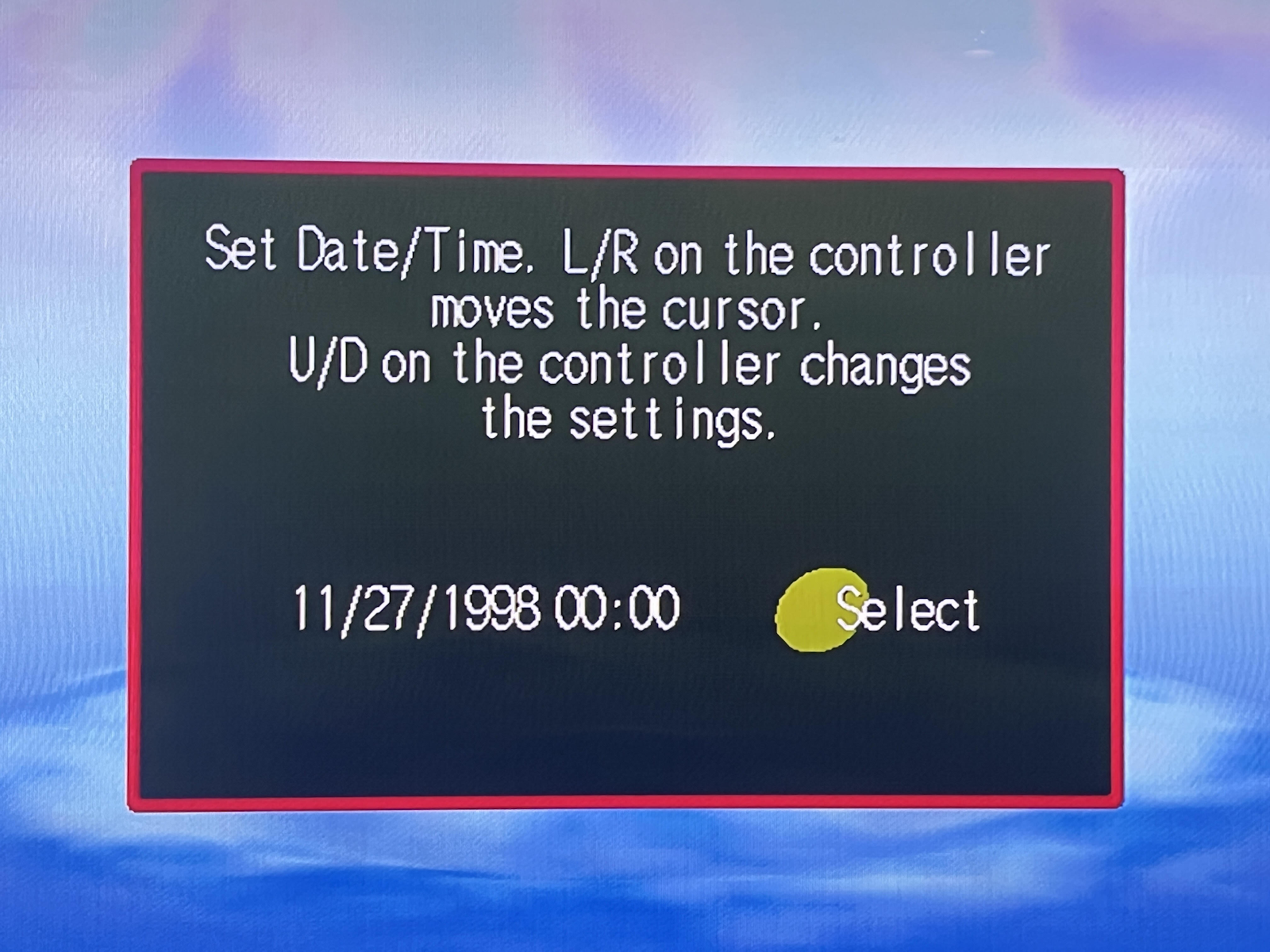 |
| In our house, it's always November 27th, 1998. |
I was a tween when I first learned of Sega’s swansong console. Undeterred by President Shoichiro Irimajiri’s creepy disembodied head at the initial Dreamcast reveal, it was ultimately Sonic Adventure which ignited my hype for the platform and all the ambitious and imaginative experiences that would come to define it.
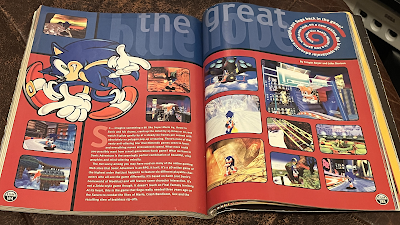 |
| (From EGM #112 November 1998) Don’t tell tween me that middle-aged me kept this tattered mag. He’d think it was weird and sad and he’d probably be right. |
 |
| (Preserved by Unseen64.net) |
Elsewhere on the software front, Virtua Fighter 3tb, Get Bass/Sega Bass Fishing, and Sega Rally 2 signaled a renewed commitment to Sega’s iconic arcade experiences at home. Blue Stinger, Pen Pen TriIcelon, and Climax Landers (eventually released as Time Stalkers in the West) flaunted their vibrancy and helped crystallize the Dreamcast’s aesthetic. AM2’s Shenmue – known as 'Project Berkley' at the time – promised to help reimagine how players might inhabit dense and bustling virtual spaces. Meanwhile, the presence of Biohazard: Code Veronica and D2 hinted at resurgent third party support from large and small game makers alike. And Godzilla Generations…was also there.
Although most of Sega’s in-house projects had yet to be unveiled in depth, they’d go on to spark a creative and innovative renaissance that continues to endear the Dreamcast to us a full 2.5 percent of a millennium later.
 |
| (From EGM's 1999 Video Game Buyer's Guide) Some of the other games I was looking forward to. |
* I mean, maybe Sega just sucked at capitalism and that's totally OK. Would we really love the Dreamcast as much today if it had been managed by a more fiscally responsible and risk-averse company?
To me, Sega’s biggest challenges of the era were inseparable from its identity. The company’s deep-rooted stubbornness and rebelliousness – while enabling its uncompromising creativity and ambition – led it to hang its fortunes on innovations the public was not yet ready to embrace (e.g. online console gaming). At the same time, Sega continued to cling to established conventions which had fueled its past success and legacy but were falling swiftly out of vogue, globally (e.g. its arcade-centric ethos). In straddling the future and past, Sega found itself awkwardly out of step with gaming's present. Sega was a perpetual pioneer yet it struggled to meet people where they were, or adapt enough to counter its competitors’ most basic strategies to woo them. Sadly — insomuch as we can feel sad for a for-profit corporation — the world was growing ambivalent to Sega’s presence and there wasn’t much anyone could do about it.
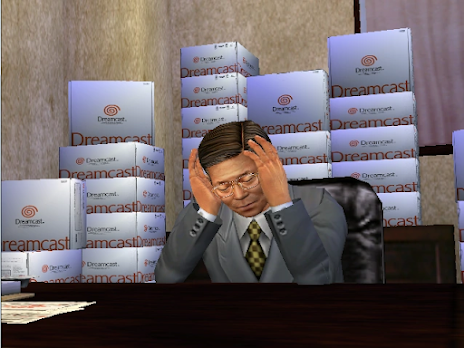 |
| (From the What's Shenmue? Dreamcast demo) |
In many ways, the Dreamcast’s Japanese launch reflected the history of this turmoil. And charmingly, Sega owned it. The company responded by promoting the platform in perhaps the most human way imaginable. Senior Managing Director Hidekazu Yukawa (R.I.P.) became the literal face of the Dreamcast to the point his image was emblazoned on a later edition of the console’s retail box. People knew him as Mr. Sega.
Sega’s Japanese Dreamcast advertising campaign was unconventionally humble and earnest, a likely reflection of Yukawa-san himself. Abandoning the brutish bluster of Segata Sanshiro’s salesmanship, Yukawa wore a friendlier face and carried a more genuine demeanor. Acknowledging the dire situation Sega found itself in, he made a gentler appeal to players. He was simply grateful for the chance they may invite the Dreamcast into their homes.
The Yukawa TV ads rolled with the punches with humility if not grace. In an early spot, demon children haunted Yukawa’s nightmares, exclaiming they didn’t need Sega just before a rift opened and swallowed him into an abyss. And when production challenges hobbled Sega’s ability to produce enough Dreamcasts to meet retail targets, Yukawa-san dedicated an ad to apologizing for the stock shortages while fans pelted him with trash (gamers, amirite?). Meanwhile, his wife wondered when he’d be done with making all these stupid commercials. It was a pitiful ad campaign in that Yukawa-san and Sega actively solicited our pity.
So yeah. Sega was having a rough time even without a new generation of competition looming in the next millennium. As such, the company aimed to seize as much of a head start as possible, hastening the Dreamcast to the Japanese market just to get it out into the world. No doubt Sega of Japan needed to start generating revenue and building a user base sooner rather than later. So as a byproduct of that, there was little time to develop games ahead of the Japanese launch. In fact, the Dreamcast rolled out with four whole titles on day one.
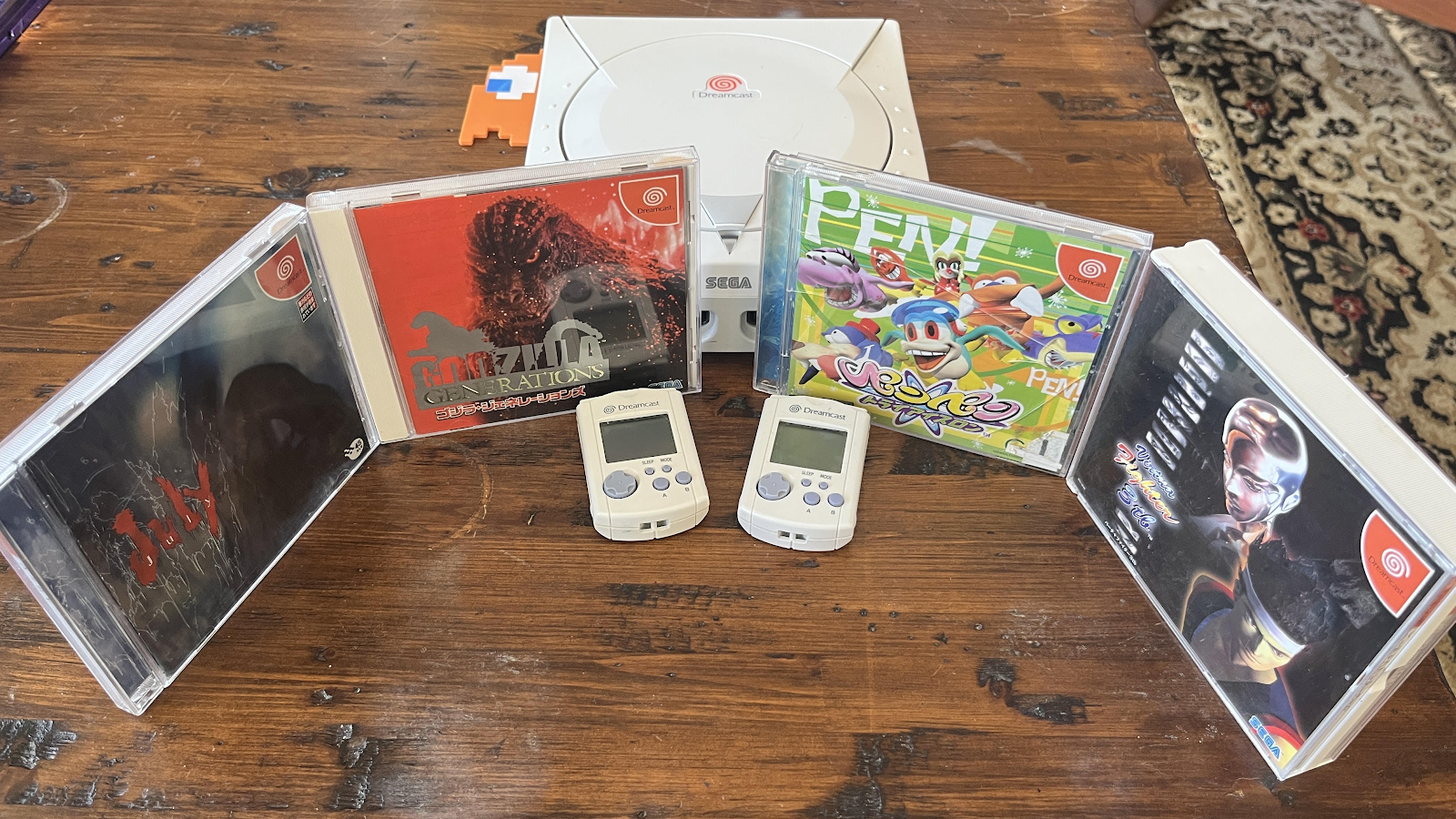 |
| The Dreamcast lobster |
I recently revisited those Japanese launch games, so I'll ramble about them next...
Jet Set Radio (or as it was known in North America, Jet Grind Radio) came skating onto the scene in the year 2000. Developed by Sega's in-house studio Smilebit, the flagship Dreamcast release saw players enrol in the rollerblading GGs gang to claim their turf back from their rivals, one graffiti tag at a time, all whilst evading the clutches of the law. A platformer at heart, JSR was fun gameplay-wise, but what kept me and many others coming back for more was undoubtedly its revolutionary cel-shaded graphics, along with its premise, style and music - all a loving tribute to hip-hop and street culture. The exceptional soundtrack, the majority of which was composed by Hideki Naganuma, combined elements of hip-hop, J-pop, funk, electronic dance, rock, acid jazz, and trip-hop, and has been lauded by fans the world over to the point where it's almost taken on a life of its own outside of the game.
 |
| North American magazine ad for Jet Grind Radio |
In the years following Jet Set Radio's release, Sega stopped making consoles and moved to being a third-party developer. Initially things were pretty good, with a wide range of their IPs receiving new titles or reboots, including Jet Set Radio, which received a beloved sequel/re-imagining on the original Xbox in the form of 2002's Jet Set Radio Future.
But, with series developers Smilebit closing their doors in 2004, and Sega's attention to any IP that wasn’t Sonic slowing to a drip feed over the following decade, the possibility of a new entry into the JSR series became less likely with each passing year. We did see a HD remaster during the seventh generation, which was cool, but the fully fledged third instalment many players have been waiting for just never happened.
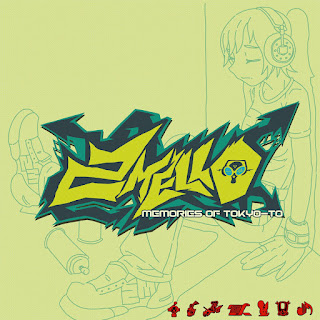 |
| The album cover for 2 Mello's "Memories of Tokyo-To" |
During the series' absence, a cult community of fans slowly began to form around Jet Set Radio, with its art style and music finally being appreciated for how excellent it really is. A fan developed a whole website to stream JSR tunes 24/7, while artists like 2 Mello made entire albums in the style of the JSR sound. Many new indie titles like Umarangi Generation and Hover aimed to emulate that funky cel-shaded feeling we were sorely missing. Seeing this community of fans and creators blossoming around JSR really got me thinking... with the series' strongest suit undoubtedly being its aesthetic style and music, and with aspects such as the story and character's personalities taking a backseat (with perhaps the exception of DJ Professor K), it made me wonder: could someone else make Jet Set Radio? We'd witnessed it in the indie space for years, with titles like Bloodstained: Ritual of the Night, Shovel Knight and Cities: Skylines filling the void left behind by the neglect of bigger developers. For me, Jet Set Radio’s best asset is not that it was made by Sega. Sure, the genius minds of Dreamcast-era Sega gave it its best assets, but the fact that Jet Set Radio's winning formula has been abandoned for so long, that it hasn't had the chance to be developed further, to become bigger and better with the power of modern systems, to be re-introduced to a new generation of gamers, is criminal, frankly. As long as the right people were involved, Jet Set Radio could come back in style, even if it meant sacrificing the name.
 |
| Lethal League Blaze |
The answer to my prayers came in 2020, when Dutch indie developer Team Reptile teased Bomb Rush Cyberfunk. Having previously worked on Lethal League, an excellent series of fighting games that feature cel-shading and character designs reminiscent of Jet Set Radio, and with the second game, Lethal League Blaze, even featuring a song from Hideki Naganuma, it was no surprise that Team Reptile were going to attempt a spiritual successor to Jet Set Radio for their next release. From their short teaser alone, I immediately knew they were the right people for the job. Bomb Rush Cyberfunk looked so much like a new Jet Set Radio game that I would've forgiven you for thinking it was made by Sega themselves. The teaser even featured a Naganuma track. It was finally happening!
Despite this, I still saw a fair amount of scepticism online. Some loyalists said they'd just wait for Sega's Jet Set Radio. Some even went as far as to accuse Team Reptile of "plagiarism". C'mon guys, it has been more than 20 years since Sega released an original entry into the Jet Set Radio series. To bastardise that famous lyric from John Lennon:
"All we are saying is, give Bomb Rush Cyberfunk a chance"
On the day it released, I bought Bomb Rush Cyberfunk for the Nintendo Switch, as that was the only console it was available for initially, and I don’t have a gaming PC, so that option was out. From the outset, the game's cel-shaded look, music and sound effects all felt familiar to me. It was great to jump back into that grinding and tagging gameplay I loved so much, to be transported right back to those special moments of playing the original JSR and Future for the first time. But Bomb Rush Cyberfunk is quick to remind you that while it remains incredibly faithful to its source material, it isn't completely derivative of it. Instead, Team Reptile are here to build and improve, which is exactly what I wanted to see from a spiritual successor to Jet Set Radio. I've always sung the praises of the gameplay refinements that Jet Set Radio Future introduced to the series, and Bomb Rush Cyberfunk is no different, picking up where that game left off but now with the benefit of twenty years of hindsight in its arsenal. Throughout this review, I will be calling back to JSR and Future many times to explain how BRC successfully builds on - or even improves - the formula, but please don't understand this as me disparaging the JSR series at all. Both Jet Set Radio and Jet Set Radio Future will forever remain two of my most favourite games of all time.
Bomb Rush Cyberfunk's plot, while still containing the appropriate dose of hip-hop and street culture references you'd expect, is crazy, and immediately more involved than either of the JSR games. Rather than functioning as stylish avatars for your rollerblading escapades, the main set of characters of the Bomb Rush crew have unique personalities and converse with each other in cutscenes, much of which is humorous and often eccentric. The main character, Red, has a purpose - to get his head, which was chopped clean off his shoulders in the game's prologue, back, while also looking to investigate the past of his replacement head (I said the plot was crazy, didn't I?).
The rival crews, still serving as your opponents throughout the game, also have more purpose in the plot, as Red and his crew not only look to defeat them to become "All City" (to claim all turf in the city), but also to gain information to aid in their hunt for Red's origins. While I won't spoil the plot here, all I'll say is the whole idea of Red being a character patched together from the body and head of two different characters, and the duality that brings, is one of the more refreshing plot ideas I've had the pleasure of experiencing in a video game as of late. There are plenty of surprising twists and turns you may not have been expecting from a game that many will be turning to primarily for its aesthetic qualities, and it is certainly refreshing to see.
Bomb Rush Cyberfunk's cast of characters are all varied in design and dripping with style, with their clothing combining the aesthetics and fashion of not only hip-hop and its b-boy subculture, but also the skate culture of the early 2000s, with some sci-fi flair thrown in for good measure. Characters like Red, with his crimson "cyberhead", and the angel-winged crash dummy Solace stand out as the coolest of the bunch, while story characters like the "oldheads" are more amusing, looking like caricatures of golden age hip-hoppers with their maroon tracksuits and over-sized Kangol-esque hats. One of them even has a cyberhead that looks suspiciously like the mask of the late MF DOOM. DJ Cyber's cold cybernetic mask and long stylised lab coat really set him apart as the menacing antagonist he is and the Dot EXE crew just look fresh as hell with their pool ball cyberheads and two stripe tracksuits. Team Reptile really knocked it out of the park when it came to matching the imaginative character design seen in the games BRC takes influence from, so much so that you will undoubtedly be searching around the game's city to track down more peeps to add to your posse.
Depending on how you look at it, one potential flaw of BRC's playable characters could be that none of them have any stats, meaning that your decision on who to play as solely comes down to how cool you think they look. Jet Set Radio did assign stats to each character, which meant there was a bit of strategy involved when making your choice of whom to tackle a particular level with, but I suppose ultimately it's probably better to be able to play as your favourite character without their weaker stats holding back your enjoyment, and it does feel great to be able to constantly switch between BRC's aesthetically pleasing cast of characters just 'cause.
 |
| Credit: JREEL on YouTube |
So we've got a great storyline and some cool characters, but how's the gameplay?